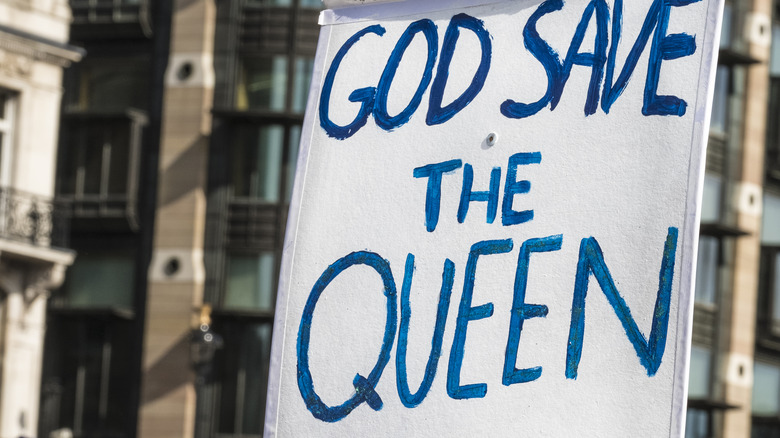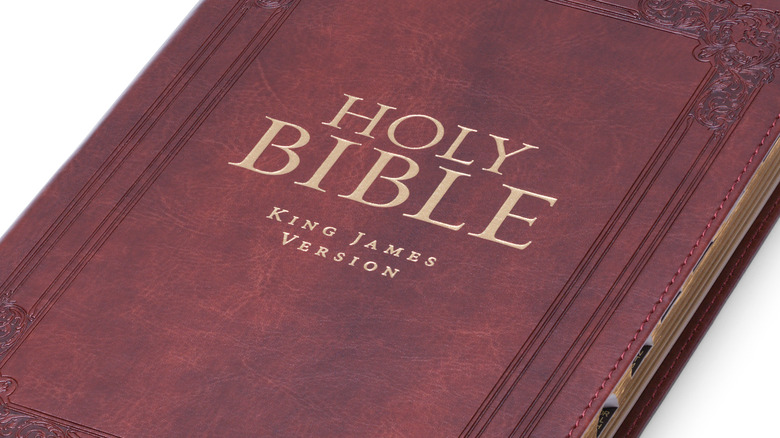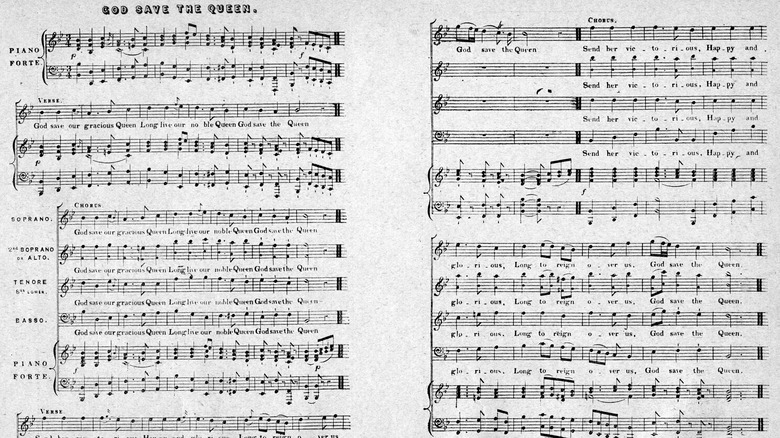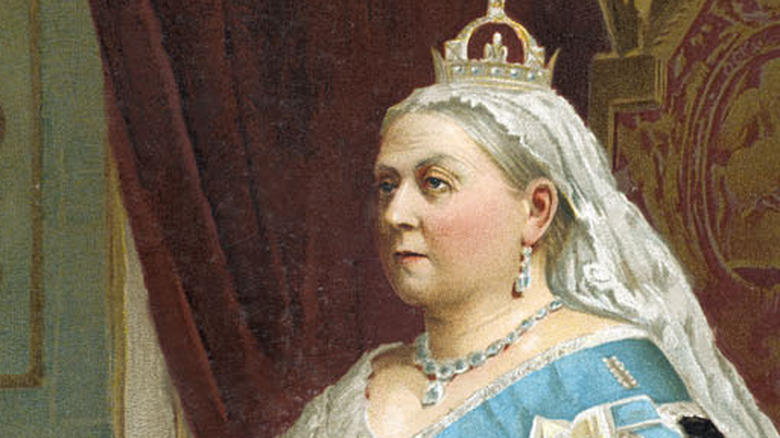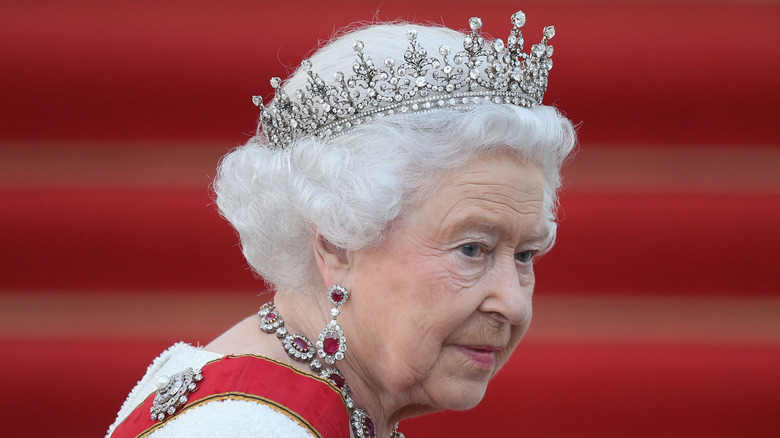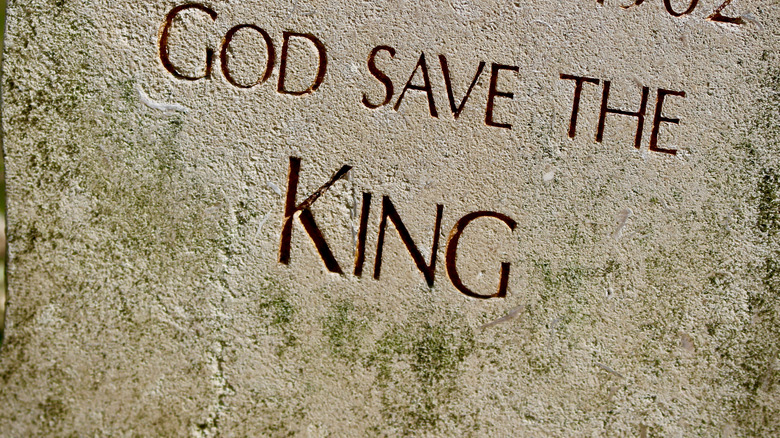The History Of God Save The Queen Explained
You've likely heard the words "God save the queen" uttered at least once in your lifetime.
But if you live in a British territory, or a country that used to be colonized by the United Kingdom, then you are definitely familiar with the saying and hear it often. Not only is it a commonly spoken phrase, it is also the name of the U.K. national anthem as well as the royal anthem in Canada, several Caribbean nations, and many more — most of which are countries that are members of the British Commonwealth (via The Royal Family). The anthem was heard many times during the Euro 2020 Championship games, ahead of games that the English team took part in, per UEFA.
Oftentimes, the words "God save the queen" are usually said to demonstrate and vocalize British patriotism and support of the British royal family. But before a woman inherited the British throne, the saying was once "God save the king." So where does this history of saving leaders of a monarchy come from?
Origin of the phrase
Before the anthem came along, first came the term. And way back then it was in reference to saving the king. The first mention of "God save the king" comes from a 16th century English translation of the Bible, according to History Today. Some versions stated "long live the king," but the King James version of the bible explicitly says the phrase in 1 Samuel chapter 10, verse 24. "And Samuel said to all the people, See ye him whom the Lord hath chosen, that there is none like him among all the people? And all the people shouted, and said, God save the king," per Bible Gateway.
Apparently, the first time it was said out loud and designated to the use that it is known for was in the mid-15th century when navy men spoke the word ahead of their travels (via Oxford Leaders Dictionaries). Whenever "God save the king" was said, the response was always "long to reign over us." As a result, on August 10, 1544 "God save King Henry" was announced, per Country Life.
Becoming an anthem
Naturally, the term became a popular motto at some point. But experts don't exactly know how or when it caught on. But according to History Today, they do know that it became so widely accepted that by the 17th century, it would be the chosen words for the opening of the British national anthem. Unfortunately, that is also an unknown area of British history. The credit to the very first known version of the anthem could be attributed to several people because it is believed that many composers had a hand in creating what is now known as the anthem. They include John Purcell, Henry Carey, Thomas Arne, and Charles Burney — and that's just a few (via Britannica). Some dates say it was first performed in the 1680s or 1740s (via JStor). Conclusively, many researchers maintain that there is just not enough evidence to trace the origins of who penned most of the song's lyrics, and that information will likely remain unknown.
The song "God Save the King" was officially performed in 1745 for the first time, per the royal family website. The monarch in power at the time was King George II who ruled from 1727 until his death in 1760 (Britannica) — the king the very first anthem referenced.
From king to queen
As long as there were kings, there were always queens. While queens did take over the throne as monarchs throughout British history, there was no official anthem back then. According to the royal family, the anthem didn't become official until the 19th century. So even though there were previous queens before King George II, there was no national song with them in reference. That would all change when Queen Victoria (pictured) succeeded William IV (via History U.K.) in 1837. Subsequently, the anthem was then changed from "God Save the King" to "God Save the Queen."
When she died in 1901 and King Edward VII inherited the throne, it was changed back to "King." It would stay like that from 1901 to 1952. Because during that time, four kings ruled the U.K., including Edward VII, who was followed by George V, Edward VIII, and George VI — the latter, the current Queen Elizabeth's father.
God Save the Queen
The current monarch of the U.K. is Queen Elizabeth II — a title she has held since 1952. She is a queen because her uncle, Edward VIII, abdicated the throne in 1936 to marry his American wife (via National Archives). As a result, his brother George VI would assume the monarch. He ruled until his death in 1952, per History. Because he had no sons and only two daughters, Princess Elizabeth and Princess Margaret, the succession to the crown would go to the eldest of the two, which was the former. A woman heading the monarchy also meant that the national anthem would change to "Queen" again. Now 95 years old, Queen Elizabeth was 25 when she became the queen, and people have been proclaiming her safety ever since.
She is the longest reigning monarch of the British throne, which means that "God Save the Queen" is the version of the anthem that has been de facto for the longest. When she dies, her successor will be her oldest son, Prince Charles. If not him for some reason, then his oldest son, Prince William, will be crowned. Whenever that happens, we know for sure when Queen Elizabeth's reign is over, the song will return to the "King" version.
How it's been used
Because the British colonized most of the English-speaking world, a lot of countries once (and others still know) knew the phrase and song very well — be it the king or queen substitution.
Per Definitions, and as it was previously mentioned, "God Save the King/Queen" is not just the name of the British national anthem. The term can be used as an interjection to either display patriotism or to conclude in agreement of something the monarch says.
British citizens say it when they sing the national song at events. Countries that are members of the British Commonwealth have their own anthems, but will sing or perform the title in the presence of the British royal family. In addition, New Zealand has its own anthem along with the U.K. one, making it one of the few countries in the world that has two national hymns, according to Britannica.
